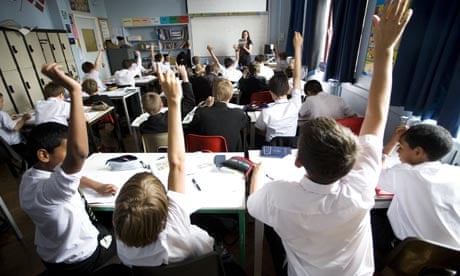Girls think they are cleverer, more successful and harder working than boys from as young as four, a study has found.
Boys come round to this view by the age of seven or eight and assume that girls will outperform them at school and behave better in lessons, research from the University of Kent shows.
The study – Gender Expectations and Stereotype Threat – will be presented to the British Educational Research Association's conference tomorrow.
The paper argues that teachers have lower expectations of boys than of girls and this belief fulfils itself throughout primary and secondary school.
Girls' performance at school may be boosted by what they perceive to be their teachers' belief that they will achieve higher results and be more conscientious than boys, the academics claim. Boys may underachieve because they pick up on teachers' assumptions that they will obtain lower results than girls and have less drive.
The findings come just over a week after exam results revealed that the gap between boys and girls at GCSE is widening. This summer, the pass rate for girls was 72.6% at A* to C, compared with 65.4% for boys. Last year, the rate was 70.5% for girls and 63.6% for boys.
The gender gap has been the focus of public and academic concern for at least 20 years.
The study's findings are based on detailed questioning of 238 children aged between four and 10. The researchers presented the pupils with statements such as "this child is really clever" and "the teacher is taking the register and this child sits very quietly". They asked the children which the statement best fitted – a picture of a girl or one of a boy.
The academics, Bonny Hartley and Robbie Sutton, also asked the children to point to one of the pictures in answer to the question "who do you think is cleverer" and "who is better behaved".
Girls at all ages said girls were cleverer, performed better and were more focused. Boys aged between four and seven were evenly divided as to which gender was cleverer and more hardworking. But by the time boys reached seven or eight, they agreed with their female peers that girls were more likely to be cleverer and more successful.
In a separate experiment, 140 of the children were divided into two groups. The academics told the first group that boys do not perform as well as girls. The second group were not told this. All the pupils were tested in maths, reading and writing.
The academics found the boys in the first group performed "significantly worse" than boys in the second group, while girls' performance was similar in both groups.
Teachers should be discouraged from using phrases such as "silly boys" and "schoolboy pranks" or asking boys why they can't "sit nicely like the girls" because this may help break the cycle of lower expectations of boys, the researchers argue.
"By seven or eight years old, children of both genders believe that boys are less focused, able and successful than girls – and think that adults endorse this stereotype," Hartley said. "There are signs that these expectations have the potential to become self-fulfilling in influencing children's actual conduct and achievement." Hartley said that while it was unacceptable to divide classes by the race of their pupils, this was not the case for gender.
"This is likely to be due to gender bias being represented as much more socially and normatively acceptable in society," Hartley said. "In this way, it is widely acceptable to pitch the boys against the girls or 'harmlessly' divide the class in this way for practical ease."
Jenny Parkes, senior lecturer in education, gender and international development at the Institute of Education, University of London, said there had been marked changes in girls' achievement in the UK in the latter half of the 20th century, in part thanks to feminism's influence on the way girls view themselves.
"This seems to be particularly the case for middle-class girls. Some studies have looked at how academic work is seen as 'feminine' and so for some boys achieving highly at school risks being labelled as feminine," Parkes said.
"At the same time, this differs across different countries, ethnic and social class groups and from subject to subject. Adults do have an important role in helping children – whether they are girls or boys, high or low achievers – to have confidence in themselves as learners."

Comments (…)
Sign in or create your Guardian account to join the discussion